#вячеслав
Explore tagged Tumblr posts
Text

Дорожная романтика
© Вячеслав Ложкин
30 notes
·
View notes
Text
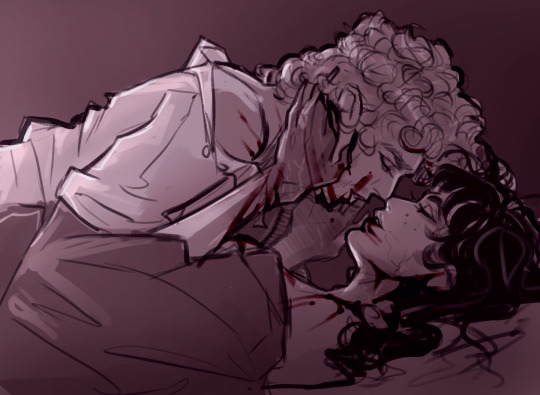
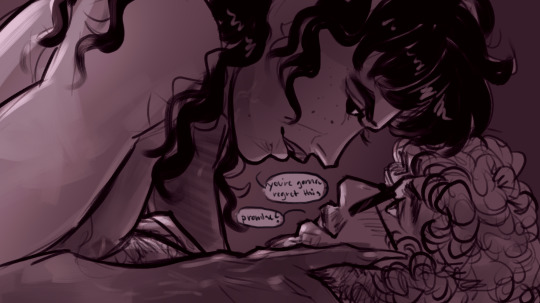




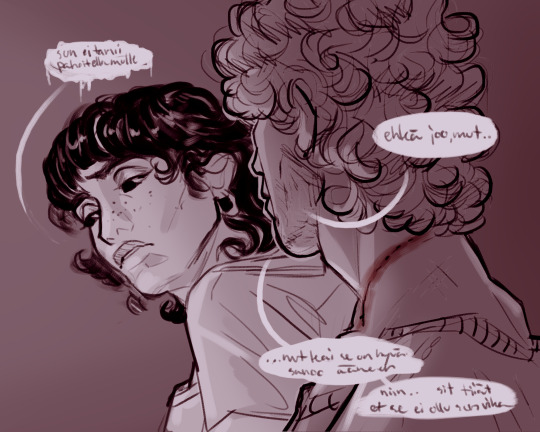
Vampire and his hunter — or hunter and her prey?
I'm normal abt Hekate and their vampire "friend" Sterling
#dnd#dnd art#art#digital art#artists on tumblr#digital artist#ttrpg#ttrpg art#oc#oc art#original character#my art#hekate#sterling#hekate (she/they) belongs to me and sterling (he/him) belongs to my most beloved friend#they're bonding over the fact that both of them have fake names and their actual names are russian#Екатерина and Вячеслав respectively#they call each other Katya and Slava and im so mentally ill about them /pos
203 notes
·
View notes
Text

Viacheslav Fetisov
#suitdaddy#suiteddaddy#suit and tie#men in suits#suited daddy#suited grandpa#suitedman#suit daddy#buisness suit#suited men#suit bulge#Suitfetish#daddy#suitedmen#silverfox#suited man#Russian man#Russian men#Viacheslav Fetisov#Вячеслав Фетисов
27 notes
·
View notes
Text

On this day in 1939, the Soviet Union invaded Poland. Hitler was already conducting an invasion from the west and Stalin joined him by invading Poland from the east.
This double invasion was part of the agreement drawn up by the foreign ministers of Nazi Germany and the USSR less than a month before.
As a result of the double invasion, the two worst people in the 20th century got to divide Eastern Europe between themselves.
Of course dictators do not necessarily stick to agreements with each other. On 22 June 1941 Hitler invaded the Soviet Union and the Molotov-Ribbentrop Pact became null and void.
History reverberates – more so in Eastern Europe than in most places.
What the 1939 Molotov-Ribbentrop Pact tells us about today’s war in Ukraine
Here's a vid made by Poland's Ministry of Foreign Affairs about a year ago.
youtube
#poland#polska#soviet invasion of poland#ussr#russian imperialism#russia#molotov-ribbentrop pact#vyacheslav molotov#joseph stalin#joachim von ribbentrop#adolph hitler#nazi germany#invasion of ukraine#vladimir putin#вячеслав молотов#иосиф сталин#пакт молотова-риббентропа#ссср#россия#владимир путин#путин хуйло#русский империализм#военные преступления#вторгнення оркостану в україну#деокупація#слава україні!#героям слава!
14 notes
·
View notes
Photo

Деревенский натюрморт. 1997. Кубарев Вячеслав (1941-2018)
74 notes
·
View notes
Text

Vyacheslav Ivanov and his muse, step-daughter and wife Vera Shvarsalon.
#вячеслав иванов#серебряный век#русский tumblr#русский тамблер#photography#vintage#Россия#Russia#русская культура#russian culture#culture#history#русское искусство#russian art#art#russian#black and white#vintage photography#1900s#20th century#silent era
10 notes
·
View notes
Text



На автомате (2024) ►
#walterkov#на автомате#слава копейкин#вячеслав копейкин#агния дитковските#tvedit#tvgifs#tvarchive#smallscreensource#dailytvwomen#dailytvsource#dailytvedit#dailytvgifs#dailytvfilmgifs#tvcentric#ruedit
5 notes
·
View notes
Text
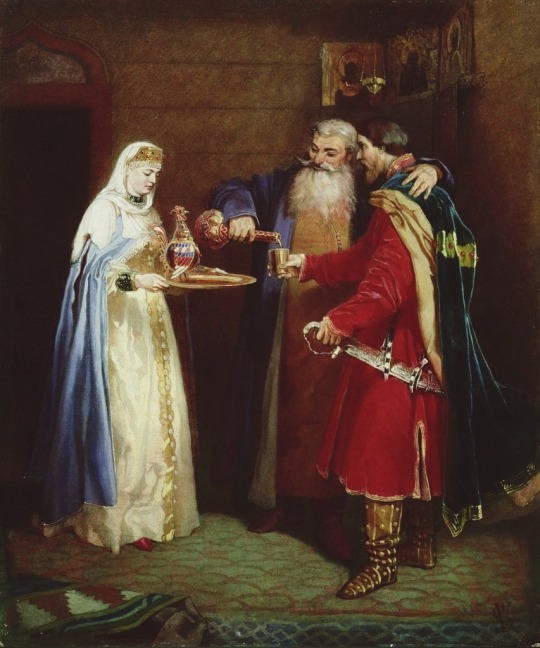
"The Boyar's Treat" V. Shvarts (1865)
"Угощение боярина" В.Шварц (1865)
19 notes
·
View notes
Text
2 notes
·
View notes
Text

#вячеслав чердаков#art#painting#light academia#vintage#aesthetic#cottagecore#art history#oil on canvas#oil painting#artist#fairytale#fantasy#dreamy#artists
4 notes
·
View notes
Text
Мужчины ошибочно считают женщин меркантильными. Просто обжигаясь о неуверенность мужчины в завтрашнем дне, об отсутствие стремления к светлому будущему (почему-то многих мужчин устраивает их жизнь, они приспосабливаются к вечным нуждам, экономии, страхам из-за незапланированных расходов), женщины в конечном итоге начинают ставить в приоритет не только чувства, но и защиту, уверенность в завтрашнем дне.
«Да женщинам нужны только деньги, все они корыстные...» Это вам нужны деньги, мужчины, но вы почему-то боитесь себе в этом признаться! Вам нужны деньги, чтобы перестать дрожать перед завтрашним днем, который может выдаться вам не по карману. Нам нужны деньги, мужчины, чтобы одеть, обуть себя, свою женщину и своих детей. Чтобы наши дети не выросли с пониманием того, что деньги — зло, а богатые люди — главные злодеи и враги.
Мы — есть зло, обесценивающее все то, что нам недоступно. Любите женщину? Любите кормить ее и обувать. Чтобы она не жила, как на минном поле, несколько шагов вперед — и взрыв.
Любите ребенка? Дайте ему уверенность в том, что когда он вырастет, то не будет собирать по миру копейки на свои 20 неполных квадратных метров. Дом, в котором может поселиться счастье — не духовны��. Он материальный...
А уж если женщина вас любит, то она обречет себя и на нищету, и на постоянный страх, и на презрение ко всему недоступному. Но не стоит обольщаться, я не думаю, что она сделает вас счастливым, если только ей самой ничего от этой жизни не нужно...
© Вячеслав Прах
4 notes
·
View notes
Text
Alina Lipchuk Алина Липчук

Alina Lipchuk Алина Липчук as “Raymonda”, “Raymonda Раймонда”, music by Aleksandr Glazunov Александр Глазунов, libretto by Lidiya Pashkova Лидия Пашкова and Marius Petipa based on a medieval legend, choreo by Andris Liepa Андрис Лиепа with choreo fragments by Marius Petipa and Aleksandr Gorsky Александр Горский, set and costume by Vyacheslav Okunev Вячеслав Окунев, Kremlin Ballet Кремлевский балет, Great Hall of the State Kremlin Palace Большой зал Государственного Кремлёвского Дворца, Moscow, Russia (September 19, 2024).
Source and more info at: Photographer Irina Abdullaeva on Threads Photographer Irina Abdullaeva on Facebook (New Born) Photographer Irina Abdullaeva on Facebook (Theater and Ballet) Photographer Irina Abdullaeva on Instagram (New Born) Photographer Irina Abdullaeva on Instagram (Theater and Ballet) Photographer Irina Abdullaeva on VKontakte Photographer Irina Abdullaeva on World Podium
Note I: This blog is open to receiving and considering any suggestions, contributions, and/or criticisms that may help correct mistakes or improve its content. Comments are available to any visitor.
Note II: Original quality of photographs might be affected by compression algorithm of the website where they are hosted.
Note III: Some links leading to the English version do not work or contain incomplete information. For this reason, they are published in their original version. You always have the option to translate the page using the right-click on your mouse.
#Aleksandr Glazunov Александр Глазунов#Aleksandr Gorsky Александр Горский#Alina Lipchuk Алина Липчук#Andris Liepa Андрис Лиепа#Раймонда#Great Hall of the State Kremlin Palace Большой зал Государственного Кремлёвского Дворца#Irina Abdullaeva Ирина Абдуллаева#Konstantin Sergeev Константин Сергеев#Kremlin Ballet Кремлевский балет#Lidiya Pashkova Лидия Пашкова#Marius Petipa#Raymonda#Russian Ballet#Vyacheslav Okunev Вячеслав Окунев#ballet#ballerina
0 notes
Text
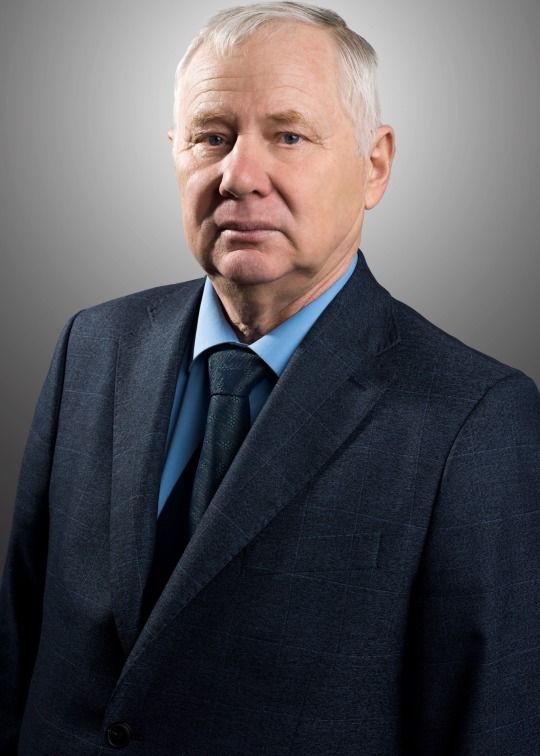
Vyacheslav Rozhansky
#suitdaddy#suiteddaddy#suit and tie#suited daddy#men in suits#silverfox#suitfetish#suited men#suited grandpa#suitedman#suit daddy#suited man#buisness suit#suitedmen#Vyacheslav Petrovich Rozhansky#Vyacheslav Rozhansky#Ukrainian man#Ukrainian men#Вячеслав Петрович Рожанськи#Вячеслав Рожанський
34 notes
·
View notes
Photo
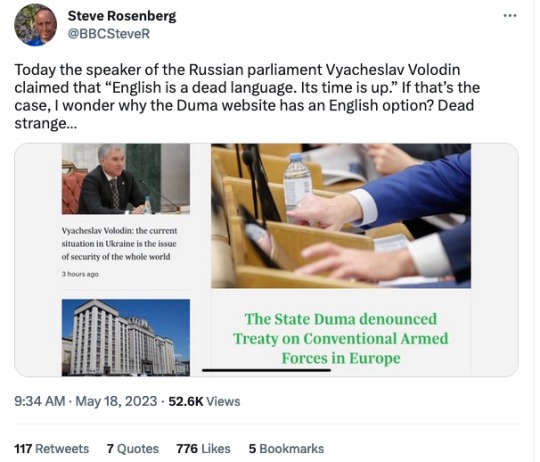
^^^ from Steve Rosenberg of the BBC.
One of the few things Russian officials are good for is their unintentionally hilarious irony.
As far as popularity of languages goes...
Mother Tongue: The Story of a Ukrainian Language Convert How one Ukrainian woman made the switch from her native Russian tongue to Ukrainian
My mother tongue tastes like ashes. Things scorched by enemy fire, then soaked with rain, touched with rot, smelling of death. I felt the taste of my mother tongue most acutely while driving through Borodianka, Bucha, and Irpin two months after these Ukrainian towns in the Kyiv region were liberated by the Ukrainian army from the Russians’ “brotherly” embrace.
Russian is my mother tongue and liberation means ripping it out of my throat.
[ ... ]
Today, I savor the cacophony of Ukrainian proper, Ukrainian broken like my mother’s, and the hybridized form of Ukrainian-Russian called “surzhyk” when I’m walking down the streets in Kyiv and Lviv. The mass displacement caused by Russia‘s war has made Ukrainians from all parts of the country listen to each other and pick up new linguistic tricks. It is by pronouncing the Ukrainian word for a loaf of bread, “palianytsia,” that a friend is now distinguished from a foe at the military checkpoints around the country. Perfectly pronounced by Russophone Ukrainians, the combination of vowels and consonants makes Russians choke on the word connoting hospitality in the country they invaded.
There are reasons to believe the eastern Ukrainians most immediately affected by the war will choose to disentangle themselves from the invaders’ language, regardless of the difficulty. With the emptiness and openness of the Ukrainian steppe in the east comes the nomadic aspect of the easterner’s identity and the freedom to reinvent oneself. Maik Yohansen comes to mind, alongside Olena Stiazhkina and Volodymyr Rafeienko, contemporary writers who became linguistic converts to Ukrainian after Russia occupied their native city of Donetsk. For decades, Ukrainian identity in the east has been not a default setting but a choice, often made against the grain of one’s upbringing. Today, this choice is existential. Even those Ukrainians who are still unable to sever the linguistic cord which ties them to the enemy are unwilling to pass the Russian language to their children. The next generation will speak Ukrainian across the country.
Go ahead and learn a handful of Ukrainian words. The first thing you’ll notice is that the Ukrainian words for YES and NO are not the same as the Russian words.
Free Ukrainian Course
#invasion of ukraine#vyacheslav volodin#dead languages#english#steve rosenberg#sasha dovzhyk#surzhyk#ukrainian#russian#россия#вячеслав володин#дума#мертвый язык#русский язык#английский язык#владимир путин#путин хуйло#добей путина#геть з україни#саша довжик#українська мова#суржик#паляниця#україна переможе#будь сміливим як україна#слава україні!#героям слава!#зеленський виявився крутішим за путіна
14 notes
·
View notes


